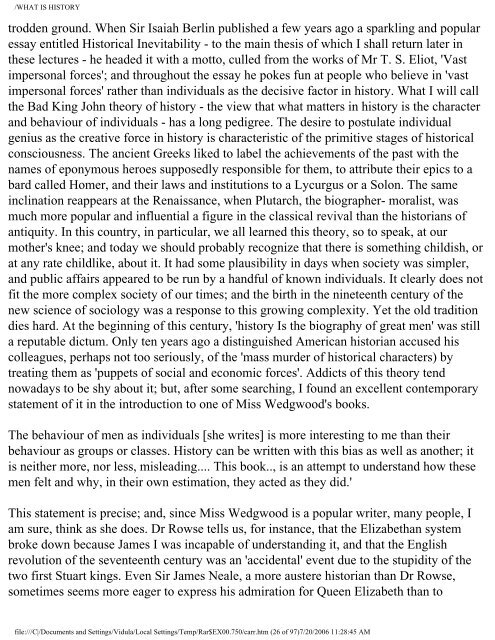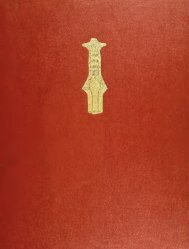What is History / by Edward Hallett Carr - Universal History Library
What is History / by Edward Hallett Carr - Universal History Library
What is History / by Edward Hallett Carr - Universal History Library
Create successful ePaper yourself
Turn your PDF publications into a flip-book with our unique Google optimized e-Paper software.
WHAT IS HISTORY<br />
trodden ground. When Sir Isaiah Berlin publ<strong>is</strong>hed a few years ago a sparkling and popular<br />
essay entitled H<strong>is</strong>torical Inevitability - to the main thes<strong>is</strong> of which I shall return later in<br />
these lectures - he headed it with a motto, culled from the works of Mr T. S. Eliot, 'Vast<br />
impersonal forces'; and throughout the essay he pokes fun at people who believe in 'vast<br />
impersonal forces' rather than individuals as the dec<strong>is</strong>ive factor in h<strong>is</strong>tory. <strong>What</strong> I will call<br />
the Bad King John theory of h<strong>is</strong>tory - the view that what matters in h<strong>is</strong>tory <strong>is</strong> the character<br />
and behaviour of individuals - has a long pedigree. The desire to postulate individual<br />
genius as the creative force in h<strong>is</strong>tory <strong>is</strong> character<strong>is</strong>tic of the primitive stages of h<strong>is</strong>torical<br />
consciousness. The ancient Greeks liked to label the achievements of the past with the<br />
names of eponymous heroes supposedly responsible for them, to attribute their epics to a<br />
bard called Homer, and their laws and institutions to a Lycurgus or a Solon. The same<br />
inclination reappears at the Rena<strong>is</strong>sance, when Plutarch, the biographer- moral<strong>is</strong>t, was<br />
much more popular and influential a figure in the classical revival than the h<strong>is</strong>torians of<br />
antiquity. In th<strong>is</strong> country, in particular, we all learned th<strong>is</strong> theory, so to speak, at our<br />
mother's knee; and today we should probably recognize that there <strong>is</strong> something child<strong>is</strong>h, or<br />
at any rate childlike, about it. It had some plausibility in days when society was simpler,<br />
and public affairs appeared to be run <strong>by</strong> a handful of known individuals. It clearly does not<br />
fit the more complex society of our times; and the birth in the nineteenth century of the<br />
new science of sociology was a response to th<strong>is</strong> growing complexity. Yet the old tradition<br />
dies hard. At the beginning of th<strong>is</strong> century, 'h<strong>is</strong>tory Is the biography of great men' was still<br />
a reputable dictum. Only ten years ago a d<strong>is</strong>tingu<strong>is</strong>hed American h<strong>is</strong>torian accused h<strong>is</strong><br />
colleagues, perhaps not too seriously, of the 'mass murder of h<strong>is</strong>torical characters) <strong>by</strong><br />
treating them as 'puppets of social and economic forces'. Addicts of th<strong>is</strong> theory tend<br />
nowadays to be shy about it; but, after some searching, I found an excellent contemporary<br />
statement of it in the introduction to one of M<strong>is</strong>s Wedgwood's books.<br />
The behaviour of men as individuals [she writes] <strong>is</strong> more interesting to me than their<br />
behaviour as groups or classes. H<strong>is</strong>tory can be written with th<strong>is</strong> bias as well as another; it<br />
<strong>is</strong> neither more, nor less, m<strong>is</strong>leading.... Th<strong>is</strong> book.., <strong>is</strong> an attempt to understand how these<br />
men felt and why, in their own estimation, they acted as they did.'<br />
Th<strong>is</strong> statement <strong>is</strong> prec<strong>is</strong>e; and, since M<strong>is</strong>s Wedgwood <strong>is</strong> a popular writer, many people, I<br />
am sure, think as she does. Dr Rowse tells us, for instance, that the Elizabethan system<br />
broke down because James I was incapable of understanding it, and that the Engl<strong>is</strong>h<br />
revolution of the seventeenth century was an 'accidental' event due to the stupidity of the<br />
two first Stuart kings. Even Sir James Neale, a more austere h<strong>is</strong>torian than Dr Rowse,<br />
sometimes seems more eager to express h<strong>is</strong> admiration for Queen Elizabeth than to<br />
file:///C|/Documents and Settings/Vidula/Local Settings/Temp/Rar$EX00.750/carr.htm (26 of 97)7/20/2006 11:28:45 AM







